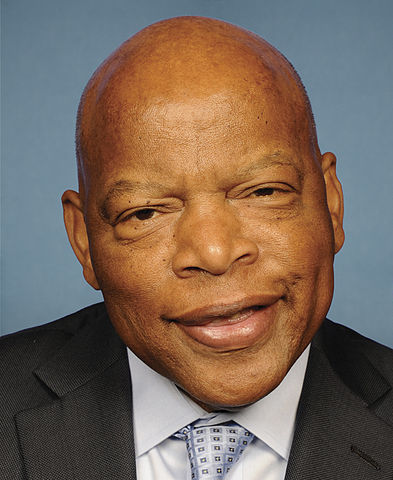
Congress is mourning the loss of one of its legendary Members, as Representative John Lewis of Georgia died from pancreatic cancer on Friday. Lewis, 80, represented the 5th Congressional District of Georgia since January 1987.
Even before his lengthy congressional career, Lewis dedicated many years to public service through the Civil Rights Movement. Lewis was born on February 21, 1940, near Troy, Alabama. His parents were sharecroppers and he attended segregated schools. While attending Fisk University, a historically black university in Nashville, Tennessee, he was active in non-violent demonstrations to challenge Jim Crow laws in the South. He organized sit-ins at segregated lunch counters in Nashville and also participated in Freedom Rides, in which he and others sat in places reserved for white patrons at interstate bus stations in the South.
In 1963, he helped organize the March on Washington, where Dr. Martin Luther King, Jr., delivered his famous “I Have A Dream” speech. Lewis was a keynote speaker alongside King at this event.
He was also a leader of the March 7, 1965, Selma to Montgomery march to protest the disenfranchisement of minorities. This day became known as “Bloody Sunday,” since the Alabama state police and deputies brutally attacked the non-violent protestors on the Edmund Pettus Bridge in Selma. Lewis suffered a fractured skull in the attack. Outcry over Bloody Sunday helped contribute to the passage of the Voting Rights Act of 1965.
As a Congressman, each year, Lewis led groups of legislators to the Edmund Pettus Bridge. On the 50th anniversary, in March 2015, he was joined by then President and First Lady Obama, former First Lady Laura and President George W. Bush, many Members of Congress and other leaders. The following year, Congress awarded the Congressional Gold Medal to the “Foot Soldiers” who participated in the marches in 1965. Prior to Lewis’ death, some called for the bridge—named after a Confederate brigadier general—to be renamed in honor of the Congressman, and in the days following his death, these calls have been renewed.
Lewis served as an officer in a number of organizations dedicated to advancing civil rights. From 1963 through 1966, he was the Chairman of the Student Nonviolent Coordinating Committee (SNCC). Following that, he was the Associate Director of the Field Foundation and later the Director of the Voter Education Project.
Lewis’ career in elective public office began in 1981, when voters elected him to Atlanta City Council. Five years later, he was elected to represent the Fifth Congressional District of Georgia. At the time of his death, he was the House Democrats’ Senior Chief Deputy Whip. He was also the Chairman of the Oversight Subcommittee on the Way and Means Committee. In Congress, Lewis continued his advocacy of civil rights and was instrumental in legislative initiatives such as the reauthorization of the Voting Rights Act of 1965 and the creation of the National Museum of African American History and Culture, the newest of the Smithsonian Institution museums.
Lewis received numerous honorary degrees and awards for his public service. President Barack Obama awarded him the Presidential Medal of Freedom, the country’s highest civilian honor, in 2011.
Lewis’ family has not announced funeral plans yet. When a sitting Member of Congress dies, their colleagues mark their passing in a number of ways, including lowering the flag over the Capitol to half-staff and adopting a memorial resolution. Representative Sanford Bishop, the dean of the Georgia Congressional Delegation, will lead a moment of silence in Lewis’ memory on Monday. More information about how Congress mourns its own can be found at our post “What Happens When a Member of Congress Dies?” Tributes from Lewis’ colleagues can be found below.
“John Lewis was a titan of the civil rights movement whose goodness, faith and bravery transformed our nation – from the determination with which he met discrimination at lunch counters and on Freedom Rides, to the courage he showed as a young man facing down violence and death on Edmund Pettus Bridge, to the moral leadership he brought to the Congress for more than 30 years…
“Every day of John Lewis’s life was dedicated to bringing freedom and justice to all. As he declared 57 years ago during the March on Washington, standing in the shadow of the Lincoln Memorial: ‘Our minds, souls, and hearts cannot rest until freedom and justice exist for all the people.’”
House Speaker Nancy Pelosi
John Lewis was an extraordinary man—a patriot in the truest sense. And he was my friend.
— Kevin McCarthy (@GOPLeader) July 18, 2020
One of the greatest honors of my life was to join him for multiple trips to Selma to march across the bridge. His life and legacy as a congressman and civil rights icon will endure. pic.twitter.com/F1Pe5qS47N
“The world is a better place because John Lewis spent his life in pursuit of freedom, justice, opportunity, and peace for all of humanity. While he is an icon in the history of America for his courage and sacrifice in making ‘good trouble,’ his enduring humility reflects the true timbre of his character. He inspired us as colleagues as the ‘conscience’ of the Congress and I am blessed to have called him my friend for over 52 years. To say John will be missed is an understatement.”
Rep. Sanford Bishop, Dean of the Georgia Congressional Delegation
(Rep. Kelly serves as the Ranking Member of the Ways and Means Committee Oversight Subcommittee, which Rep. Lewis chaired.)
Mark Strand is the President of the Congressional Institute and Timothy Lang is a research director. The Sausage Factory blog is a Congressional Institute project dedicated to explaining parliamentary procedure, Congressional politics, and other issues pertaining to the Legislative Branch.